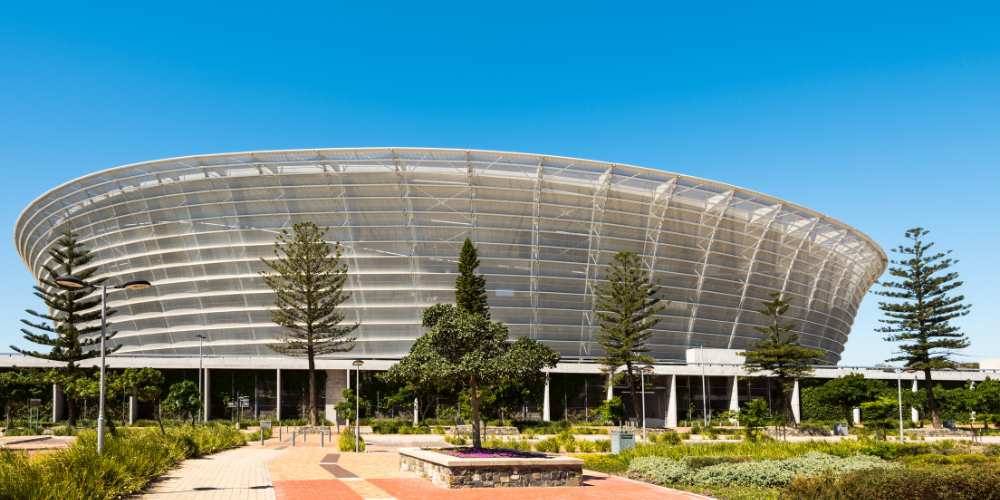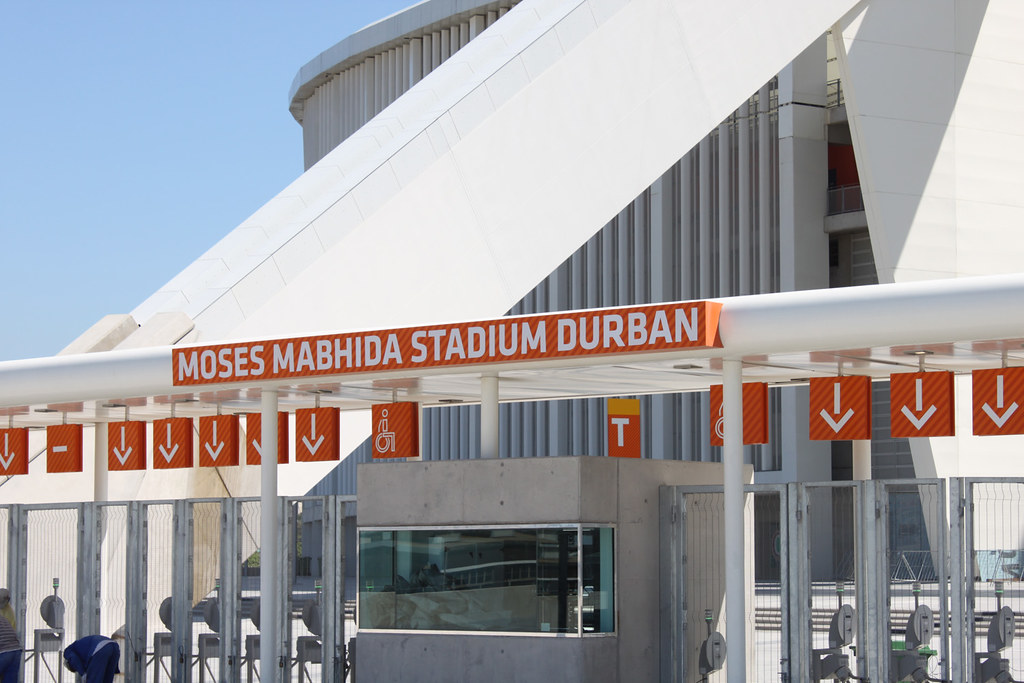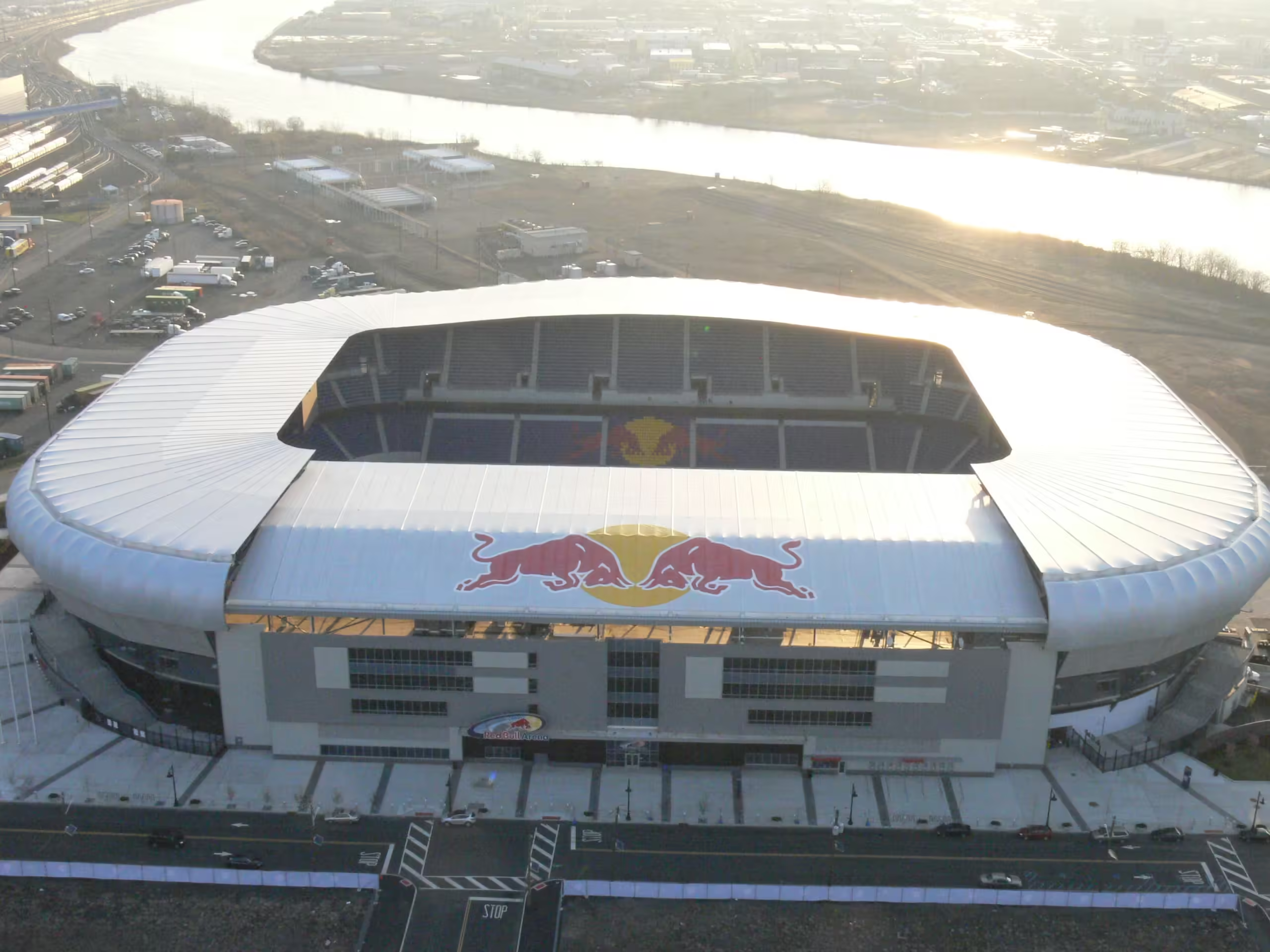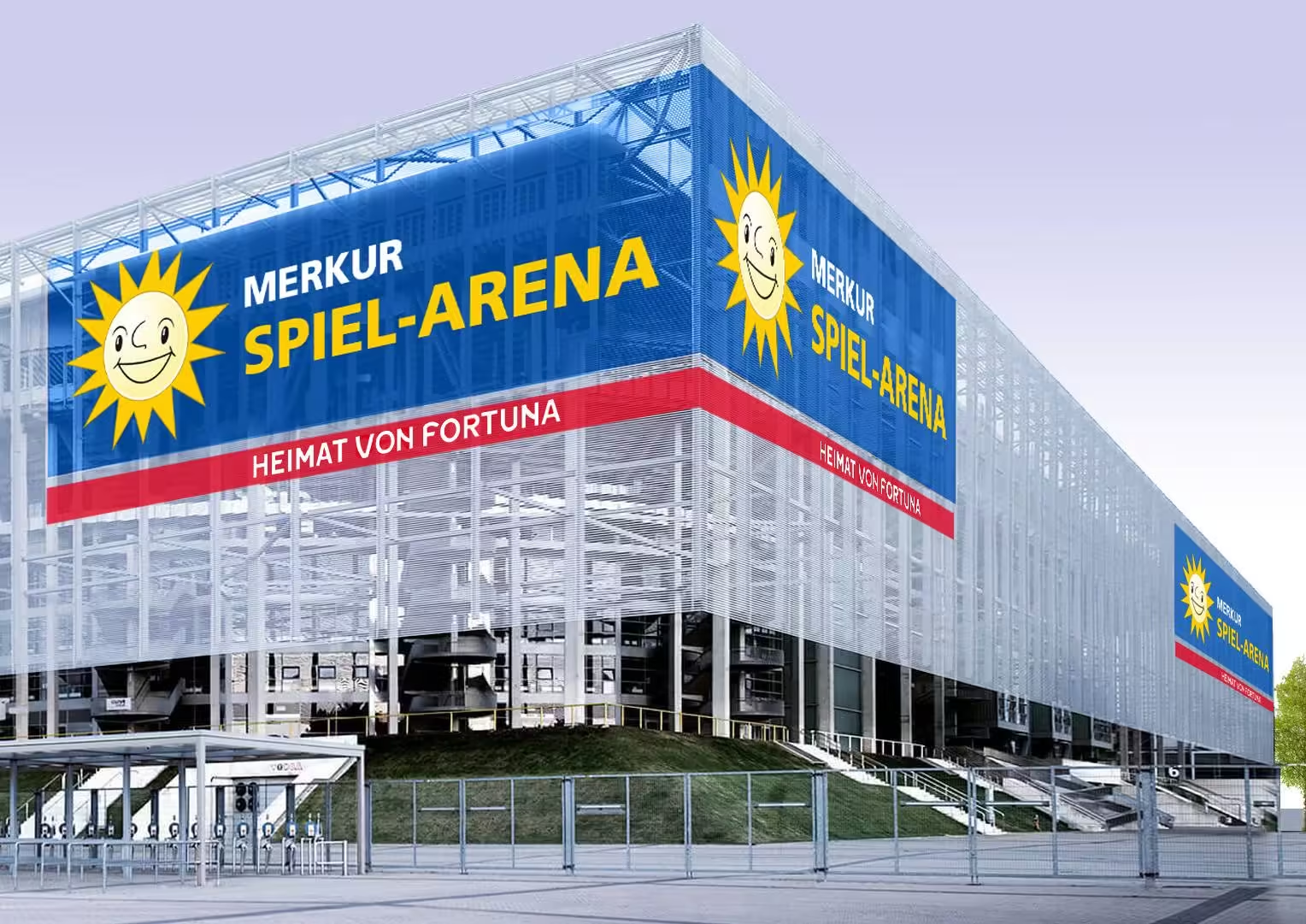Cape Town Stadium, also known as the DHL Stadium, is a multi-purpose stadium located in Cape Town, South Africa. It was built for the 2010 FIFA World Cup and has since been used for various sports and entertainment events. The stadium has a seating capacity of 55,000 and is known for its unique design and location.
The stadium was constructed on the site of the old Green Point Stadium and was completed in 2009. It was designed by a consortium of architects, including GMP Architekten, Louis Karol, and Point Architects. The stadium’s design was inspired by the surrounding landscape, with the roof resembling the shape of a mountain and the exterior resembling a bowl. The stadium is located in the Green Point area near the Atlantic Ocean and the V&A Waterfront, making it a popular destination for tourists.
Key Takeaways
- Cape Town Stadium is a multi-purpose stadium located in Cape Town, South Africa, that was built for the 2010 FIFA World Cup.
- The stadium has a seating capacity of 55,000 and is known for its unique design and location in the Green Point area near the Atlantic Ocean and the V&A Waterfront.
- The stadium has been used for various sports and entertainment events and has played a significant role in the economic development of the surrounding area.
Cape Town Stadium History
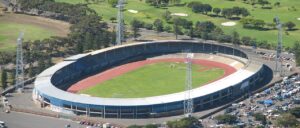
Construction
Cape Town Stadium, previously known as Green Point Stadium, is an association football and rugby union stadium located in Cape Town, South Africa. The stadium was built for the 2010 FIFA World Cup, and construction began in March 2007. The cost of construction was R$4.4 billion. The stadium was designed by German architects GMP Architekten and Louis Karol, an African architect.
The stadium has a seating capacity of 55,000 and is located in the Green Point area of Cape Town. The stadium is known for its unique design, which was inspired by the African continent’s natural beauty. The stadium’s roof has an oval shape, which resembles the shape of a flower. The roof is made of fiberglass and is translucent, allowing natural light to enter the stadium.
Inauguration
Cape Town Stadium was officially opened on December 14, 2009, with a formal opening ceremony. The first match was played on January 23, 2010, between Ajax Cape Town and Santos.
The stadium has been used for various events since its opening, including concerts, religious gatherings, and sporting events. The stadium has also been used as a filming location for movies and television shows.
Major Events
Cape Town Stadium was one of the ten stadiums used for the 2010 FIFA World Cup. The stadium hosted eight matches during the tournament, including a quarter-final match between the Netherlands and Brazil.
In 2011, the stadium hosted the final of the Rugby World Cup between New Zealand and France. The stadium also hosted the 2015 Africa Cup of Nations, which was won by the Ivory Coast.
In 2022, the stadium hosted the final of the T20 World Cup between Australia and Pakistan. The stadium has also been used for various music concerts, including performances by Coldplay, U2, and Rihanna.
Cape Town Stadium Architecture
Design
Cape Town Stadium is an iconic landmark of South Africa, located in the Green Point neighborhood of Cape Town. The stadium was designed by the German architectural firm gmp · Architects von Gerkan, Marg und Partner. The design of the stadium is inspired by the African continent and its unique landscapes. The stadium’s exterior is clad in a translucent membrane that allows natural light to filter through, creating a dynamic and ever-changing facade. The roof of the stadium is designed to resemble a traditional African bowl, with a series of triangular panels that overlap and create a unique pattern.
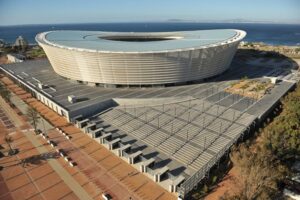
Capacity
The stadium has a seating capacity of 68,000 and is used for both association football and rugby union matches. During the 2010 FIFA World Cup, the stadium hosted eight matches, including the opening and closing matches. The stadium has also hosted other major sporting events, such as the 2015 Rugby World Cup and the 2013 African Cup of Nations.
Sustainability Features
Cape Town Stadium was designed with sustainability in mind. The stadium’s translucent membrane exterior allows natural light to filter through, reducing the need for artificial lighting during the day. The stadium also has a rainwater harvesting system that collects rainwater from the roof and uses it to irrigate the surrounding landscape. The stadium’s energy-efficient lighting system reduces energy consumption and carbon emissions.
Overall, Cape Town Stadium is a remarkable feat of architecture and engineering. Its unique design, seating capacity, and sustainability features make it an iconic landmark of South Africa.
Cape Town Stadium Location
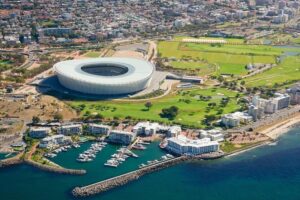
Geography
Cape Town Stadium is located in the suburb of Green Point in Cape Town, South Africa. The stadium is situated on the Atlantic Ocean and offers stunning views of the water. The stadium is surrounded by a number of attractions, including the Green Point Urban Park and the V&A Waterfront, which is just a short walk away.
The stadium is situated on a 10-hectare site and has a seating capacity of 55,000. It was built for the 2010 FIFA World Cup and is one of the most modern stadiums in the world. The stadium has a unique design, with a translucent roof that allows natural light to filter through.
Accessibility
Cape Town Stadium is easily accessible by car, bus, and train. There are a number of parking options available, including the stadium’s own parking garage, which has over 1,200 parking bays. The stadium is also located on a number of bus routes, and the Cape Town MyCiTi bus service has a stop right outside the stadium.
For those travelling by train, the Cape Town Stadium is located just a short walk from the Cape Town station. The stadium is also located close to a number of hotels, making it an ideal location for visitors to the city.
Cape Town Stadium Facilities

Pitch
Cape Town Stadium is a world-class stadium with a high-quality pitch. The pitch is made of natural grass and is well-maintained to ensure optimal playing conditions for football and rugby matches. The pitch has a state-of-the-art irrigation system that allows for efficient watering and drainage. The stadium also has a backup pitch that can be used in case of emergency.
Seating
The stadium has a seating capacity of 55,000, with seating arranged in a bowl shape to provide excellent views of the pitch from every angle. The seats are comfortable and well-spaced, with ample legroom for spectators. The stadium also has designated areas for disabled spectators, with wheelchair-accessible seating available.
Amenities
Cape Town Stadium has a range of amenities to make the spectator experience more enjoyable. There are numerous food and beverage outlets throughout the stadium, offering a variety of snacks, drinks, and meals. The stadium also has several merchandise shops, selling official team merchandise and souvenirs. The stadium has ample restroom facilities, with separate facilities for men, women, and disabled spectators. The stadium also has first aid stations and medical facilities in case of emergencies.
Overall, Cape Town Stadium is a world-class facility that provides an excellent spectator experience. With a high-quality pitch, comfortable seating, and a range of amenities, the stadium is an excellent venue for football and rugby matches, as well as other events.
Events at Cape Town Stadium

Cape Town Stadium is a popular venue for various events, ranging from sports to concerts and conferences. The stadium has hosted several high-profile events since its opening in 2009, including the 2010 FIFA World Cup. Here are some of the events you can expect to see at the stadium:
Sports
Cape Town Stadium is the home ground of the Cape Town City Football Club and the Stormers rugby team. The stadium has also hosted several international sports events, including soccer and rugby matches. The stadium’s seating capacity of 55,000 makes it an ideal venue for large-scale sports events.
Concerts
The stadium has hosted several major concerts featuring local and international artists, including Coldplay, Justin Bieber, and Ed Sheeran. The stadium’s state-of-the-art sound system and lighting make it an ideal venue for music events. The stadium also has several food and beverage outlets, ensuring that concert-goers have access to refreshments during events.
Conferences
Cape Town Stadium is a popular venue for conferences and exhibitions. The stadium has several conference rooms and exhibition spaces, making it an ideal venue for large-scale events. The stadium’s location in the heart of Cape Town also makes it easily accessible for attendees.
In conclusion, Cape Town Stadium is a versatile venue that can host a wide range of events. Whether you’re a sports fan, music lover, or business professional, the stadium has something to offer. With its state-of-the-art facilities and prime location, Cape Town Stadium is a top choice for event organizers in South Africa.
Economic Impact
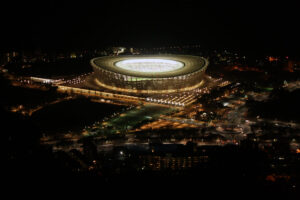
The Cape Town Stadium has had a significant economic impact on the city and surrounding areas. The construction of the stadium created thousands of jobs, providing a boost to the local economy. Additionally, the stadium continues to generate revenue through ticket sales, concessions, and sponsorship deals.
According to African Sahara, the stadium has contributed positively to the restaurants and pubs in the immediate vicinity. Events hosted at the stadium have a positive impact on the occupancy rate at hotels, B&Bs, and Airbnbs in the region, which has far outweighed its costs.
The Cape Town Stadium has also helped to establish Cape Town as a premier destination for international events. The stadium has hosted numerous high-profile events, including the 2010 FIFA World Cup, which brought in a significant amount of revenue for the city.
Overall, the economic impact of the Cape Town Stadium has been significant. It has created jobs, boosted the local economy, and helped to establish Cape Town as a premier destination for international events.
Management and Ownership
Cape Town Stadium is a multi-purpose stadium located in Green Point, Cape Town, South Africa. It is owned by the City of Cape Town and managed by the Cape Town Stadium (RF) SOC Limited (CTS), which was established as a Municipal Entity (ME) in 2018. The ME was created with the aim of enabling the City of Cape Town to fully commercialize its multi-purpose stadium, now known as DHL Stadium, and to generate revenue from the facility.
The stadium is managed by a board of directors, which is responsible for the overall strategic direction of the stadium. The board is appointed by the City of Cape Town and is made up of a mix of City officials and independent directors with relevant expertise. The board is responsible for ensuring that the stadium is run efficiently and effectively, and that it generates revenue for the City.
The day-to-day operations of the stadium are managed by a team of professionals with expertise in various areas, including facility management, marketing, hospitality, and events management. The team is led by a CEO, who is responsible for the overall management of the stadium. The CEO is supported by a team of managers, who are responsible for specific areas of the stadium’s operations.
Overall, the management and ownership of Cape Town Stadium is designed to ensure that the stadium is run efficiently and effectively, and that it generates revenue for the City of Cape Town. The stadium is a valuable asset for the City, and it is managed with the aim of maximizing its potential and ensuring that it continues to contribute to the economic development of the region.
Frequently Asked Questions
What is the seating capacity of Cape Town Stadium?
Cape Town Stadium has a seating capacity of 55,000. It is a multipurpose stadium that was built for the 2010 FIFA World Cup. The stadium is located in Green Point, Cape Town, South Africa and is known for its unique design and architecture.
Does Cape Town Stadium host cricket matches?
No, Cape Town Stadium does not host cricket matches. However, it is used for various other sports events, including rugby and football matches, as well as concerts and other events.
What are the seating arrangements at Cape Town Stadium?
The seating arrangements at Cape Town Stadium are divided into three main sections: the lower tier, middle tier, and upper tier. The lower tier seats are located closest to the field and offer the best views of the action. The middle tier seats are located in the middle of the stadium and offer a good view of the field. The upper tier seats are located at the top of the stadium and offer a panoramic view of the surrounding area.
Has Cape Town Stadium undergone any recent renovations or demolitions?
Cape Town Stadium has not undergone any recent renovations or demolitions. However, the stadium was built for the 2010 FIFA World Cup and underwent extensive renovations at that time to ensure that it met all of the necessary requirements for the tournament.
What events are scheduled at Cape Town Stadium in 2024?
As of May 2024, there are no events currently scheduled at Cape Town Stadium for the rest of the year. However, the stadium regularly hosts rugby and football matches, as well as concerts and other events throughout the year.
Which sports teams regularly play their matches at Cape Town Stadium?
The two main sports teams that regularly play their matches at Cape Town Stadium are Cape Town City FC and Ajax Cape Town FC. Both teams are based in Cape Town and compete in the Premier Soccer League. The stadium is also used as a home ground for the South African national rugby union team, the Springboks, for some of their matches.
Other Stadiums Articles:
Check Out: Dobsonville Stadium: A Comprehensive Guide to the Home of Soweto’s Football Giants
Check Out: Pietersburg Stadium: A Comprehensive Guide to the Venue
Check Out: Bidvest Stadium: Home of the Bidvest Wits Football Club
Check Out: Molineux Stadium: History, Capacity, and Location
Check Out: Selhurst Park Stadium: Home of Crystal Palace FC
